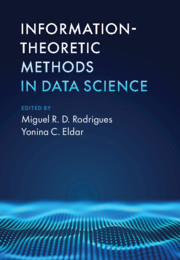Book contents
- Frontmatter
- Dedication
- Contents
- Preface
- Notation
- Contributors
- 1 Introduction to Information Theory and Data Science.
- 2 An Information-Theoretic Approach to Analog-to-Digital Compression
- 3 Compressed Sensing via Compression Codes
- 4 Information-Theoretic Bounds on Sketching
- 5 Sample Complexity Bounds for Dictionary Learning from Vector- and Tensor-Valued Data
- 6 Uncertainty Relations and Sparse Signal Recovery
- 7 Understanding Phase Transitions via Mutual Information and MMSE
- 8 Computing Choice: Learning Distributions over Permutations
- 9 Universal Clustering
- 10 Information-Theoretic Stability and Generalization
- 11 Information Bottleneck and Representation Learning
- 12 Fundamental Limits in Model Selection for Modern Data Analysis
- 13 Statistical Problems with Planted Structures: Information-Theoretical and Computational Limits
- 14 Distributed Statistical Inference with Compressed Data
- 15 Network Functional Compression
- 16 An Introductory Guide to Fano’s Inequality with Applications in Statistical Estimation
- Index
- References
16 - An Introductory Guide to Fano’s Inequality with Applications in Statistical Estimation
Published online by Cambridge University Press: 22 March 2021
- Frontmatter
- Dedication
- Contents
- Preface
- Notation
- Contributors
- 1 Introduction to Information Theory and Data Science.
- 2 An Information-Theoretic Approach to Analog-to-Digital Compression
- 3 Compressed Sensing via Compression Codes
- 4 Information-Theoretic Bounds on Sketching
- 5 Sample Complexity Bounds for Dictionary Learning from Vector- and Tensor-Valued Data
- 6 Uncertainty Relations and Sparse Signal Recovery
- 7 Understanding Phase Transitions via Mutual Information and MMSE
- 8 Computing Choice: Learning Distributions over Permutations
- 9 Universal Clustering
- 10 Information-Theoretic Stability and Generalization
- 11 Information Bottleneck and Representation Learning
- 12 Fundamental Limits in Model Selection for Modern Data Analysis
- 13 Statistical Problems with Planted Structures: Information-Theoretical and Computational Limits
- 14 Distributed Statistical Inference with Compressed Data
- 15 Network Functional Compression
- 16 An Introductory Guide to Fano’s Inequality with Applications in Statistical Estimation
- Index
- References
Summary
Information theory plays an indispensable role in the development of algorithm-independent impossibility results, both for communication problems and for seemingly distinct areas such as statistics and machine learning. While numerous information-theoretic tools have been proposed for this purpose, the oldest one remains arguably the most versatile and widespread: Fano’s inequality. In this chapter, we provide a survey of Fano’s inequality and its variants in the context of statistical estimation, adopting a versatile framework that covers a wide range of specific problems. We present a variety of key tools and techniques used for establishing impossibility results via this approach, and provide representative examples covering group testing, graphical model selection, sparse linear regression, density estimation, and convex optimization.
Information
- Type
- Chapter
- Information
- Information-Theoretic Methods in Data Science , pp. 487 - 528Publisher: Cambridge University PressPrint publication year: 2021
References
Accessibility standard: Unknown
Why this information is here
This section outlines the accessibility features of this content - including support for screen readers, full keyboard navigation and high-contrast display options. This may not be relevant for you.Accessibility Information
- 3
- Cited by
